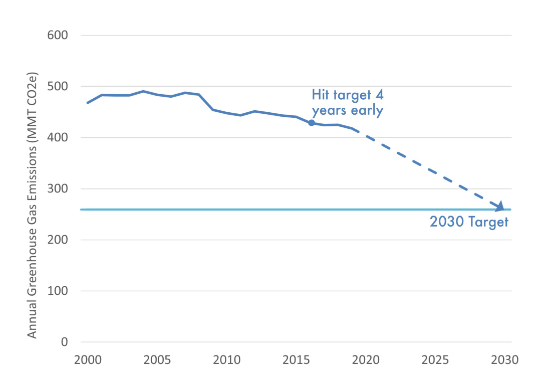California Construction News staff writer
California just jumped onto a faster track to reach climate goals, with Gov. Gavin Newsom setting ambitious new targets for renewable energy, clean buildings, carbon removal, and clean fuels in the transportation sector. The governor’s accelerated climate plan reinforces California’s leadership in addressing climate change, and will move the state faster toward carbon neutrality, a governor’s office statement says.
In a letter to the Chair of the California Air Resources Board (CARB), Newsom called for the state to ensure that the 2022 Climate Change Scoping Plan provides a path to achieve both the 2030 climate goal and state carbon neutrality no later than 2045, requesting that the final plan incorporate new efforts to advance offshore wind, clean fuels, climate-friendly homes, carbon removal and addressing methane leaks.
Last month, Newsom signed a state budget that will make it easier to bring clean energy projects online, speeding up the environmental review process of new clean energy projects, and helping the state move away from electricity generated from fossil fuels.
“We need to supercharge our efforts to significantly reduce harmful carbon pollution. The state’s draft carbon neutrality road map doesn’t go far enough or fast enough. That’s why I’m pushing state agencies to adopt more aggressive actions, from offshore wind to climate-friendly homes, and to make sure we never build another fossil fuel power plant in California again,” said Newsom.
He also announced the launch of a new climate dashboard highlighting state climate action and progress toward key targets. CalEPA will continue to expand the dashboard to help Californians understand the actions the state is taking to adapt to a changing climate, and track progress in areas such as zero-emission vehicle sales, clean energy job creation and consumer savings from energy efficiency standards.
The Governor says he will work with the Legislature to enshrine carbon neutrality into state law, increase the state’s ambition towards our 2030 climate goals and accelerate our clean energy targets, while supporting carbon sequestration from our natural and working lands and advancing safe and equitable engineered carbon removal. He will also work to finalize the state’s historic investments under the $53.9 billion climate commitment, with a focus on equity and community resilience, while expanding opportunities for climate innovation and manufacturing here in California.
The new targets and requested actions outlined in the letter include:
- Offshore Wind: Establishing a California Energy Commission planning goal of at least 20GW of offshore wind in 2045.
- Clean and Healthy Buildings: Creating a goal of 3 million climate-ready and climate-friendly homes by 2030 and 7 million by 2035, supplemented by 6 million heat pumps by 2030, and directing 50 percent of investments to low-income and disadvantaged communities.
- Moving Away from Fossil Fuels: Directing state agencies to plan for an energy transition to meet our long-term energy goals that avoids the need for new natural gas plants, while ensuring reliability. Establishing a 20 percent clean fuels target for the aviation sector. The governor also requested that CARB evaluate a more stringent Low Carbon Fuel Standard and accelerate refinery transitions to clean fuels production.
- Methane: Forming a Task Force to identify and address methane leaks from oil infrastructure near communities, recognizing the threats these leaks can pose to community health and safety.
- Carbon Removal: Setting a 20 MMT carbon removal target for 2030 and 100 MMT carbon removal target for 2045, emphasizing the role of natural and working lands and the need for safe and equitable engineered carbon removal.
- Increasing Climate Ambition: Partnering with the Legislature to make carbon neutrality state law and accelerate progress toward California’s 2030 target; bring new ambition to the state’s clean energy goals; develop policy to support sequestration from natural and working lands while incorporating industrial carbon capture in carbon neutrality efforts; and finalize investments under the state’s $53.9 billion Climate Commitment.
The California Air Resources Board will meet in the fall to consider adopting a final draft of the 2022 Climate Change Scoping Plan.













